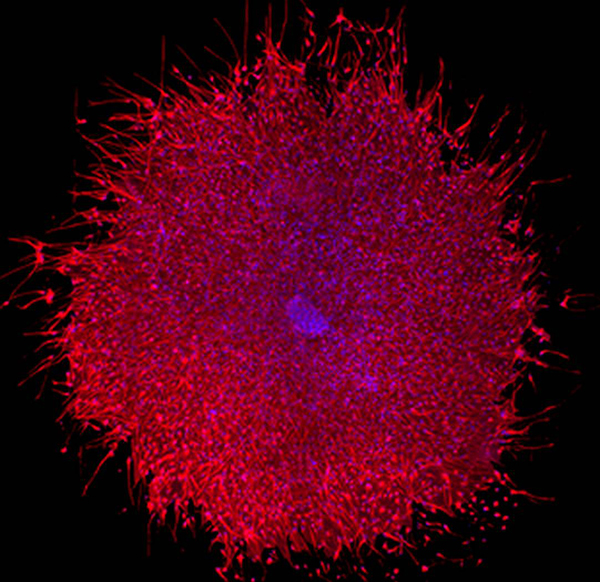
USC Professors Roberta Diaz Brinton of the USC School of Pharmacy and Lon Schneider of the Keck School of Medicine of USC are principal investigators of a newly funded study from the National Institutes of Health aimed at testing promising drugs for the prevention of Alzheimer’s disease.
The USC project, “Allopregnanolone Regenerative Therapeutic for MCI/Alzheimer’s: Dose Finding Phase 1,” is the first clinical trial to evaluate the safety and tolerability of using allopregnanolone, a natural brain steroid, in treating mild cognitive impairment and Alzheimer’s, as part of an intensified national effort to find effective interventions for the degenerative brain disease.
“The NIA grant provides an extraordinary opportunity to advance our discovery and translational research on allopregnanolone (Allo) to a clinical trial,” said Brinton, who holds the R. Pete Vanderveen Chair in Therapeutic Discovery and Development at the USC School of Pharmacy. “Our research has shown that Allo activates neural stem cells in the brain to generate new nerve cells and to restore cognitive function while also reducing the pathology of Alzheimer’s. Allo is the first regenerative therapeutic for Alzheimer’s that has the potential to regenerate nerve cells and the pathways necessary for memory. We are excited to begin the clinical trial of Allo and to advance innovative therapeutic approaches for this devastating disease.”
With $2.4 million in new funding from the NIH, announced today, the study builds on Brinton’s research that has shown that “Allo” promotes the generation of new brain cells, reduces amyloid levels and restores cognitive function in pre-clinical animal testing. The clinical trial will evaluate the safety and tolerability of the drug over 12 weeks.
The study is among the first to be developed with direction from the 2012 NIH “Alzheimer’s Disease Research Summit: Path to Treatment and Prevention” and reflects research goals in the “National Plan to Address Alzheimer’s Disease,” according to the announcement from the National Institutue of Aging, the lead agency within the NIH for Alzheimer’s research.
NIA has supported Brinton’s research over many years, including basic science grants to understand allopregnanolone’s mechanism of action in the brain, a drug development grant which included development of optimal dose and formulation, and support for pre-clinical toxicology studies. This new support helps bring Brinton and Schneider’s research to a human Phase 1 trial.
“As many as five million Americans face the challenge of Alzheimer’s disease, which robs them of their memories, their independence and ultimately their lives,” said Francis Collins, NIH director. “We are determined, even in a time of constrained fiscal resources, to capitalize on exciting scientific opportunities to advance understanding of Alzheimer’s biology and find effective therapies as quickly as possible.”
“We know that Alzheimer’s-related brain changes take place years, even decades, before symptoms appear. That really may be the optimal window for drugs that delay progression or prevent the disease altogether,” said NIA Director Richard Hodes. “The clinical trials getting underway with these funds will test treatments in symptom-free volunteers at risk for the disease, or those in the very earliest stages, where we hope we can make the biggest difference.”
Basic and genetic studies of Alzheimer’s have already provided new insights into the biological underpinnings of this extremely complex disorder, Hodes said. The funding supports translational research focused on identifying, characterizing and validating new therapies to stop the progression of the disease.
“Our allopregnanolone project is a paradigm shift in treating Alzheimer’s disease—away from the current, experimental, anti-amyloid strategy and toward a novel, nerve cell regenerative therapeutic strategy that has not been tested previously in humans,” said Schneider, who directs the USC California Alzheimer’s Disease Center and the clinical core of USC’s NIH-funded Alzheimer’s Disease Research Center. “This early phase trial will allow us to determine dosage levels in patients with early Alzheimer’s disease and to evaluate the potential for therapeutic effect by using brain imaging and cognitive function testing.”
The award is part of the National Alzheimer’s Project Act (NAPA), which calls for a stepped-up national effort on research, care and services for Alzheimer’s and related dementias. The 2011 law mandated that the U.S. Department of Health and Human Services establish a National Plan to Address Alzheimer’s Disease. The initial plan and its 2013 update call for the prevention and effective treatment of Alzheimer’s by 2025. For more on research milestones and progress under the Plan, visit http://aspe.hhs.gov/daltcp/napa/milestones/index.shtml.
In addition to the support from the NIA, Brinton’s work has been supported by the Kenneth T. and Eileen Norris Foundation, the Whittier Foundation and the Alzheimer’s Drug Discovery Foundation.
